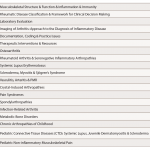
Rawpixel.com/shutterstock.com
Editor’s note: The new Pillar Talk column is developed by the ARHP Executive Committee in an effort to share information about ongoing activities related to our four pillars: Education, Practice, Research and Advocacy.
The ARHP Online Education Portfolio continues to evolve and grow. The Advanced Rheumatology Course (ARC) and the Fundamentals of Rheumatology Course (FRC) still form the backbone of ARHP online educational offerings. Yet January 2017 saw the launch of ARHP Rheumatology eBytes, which are brief, but rich, learning opportunities. This article summarizes the current status of our Online Education Portfolio, as well as where online education will likely be heading in the future.
Advanced Rheumatology
The ARC offers 19 modules presented by clinical experts from across the U.S. Of these, six are core modules of interest to all rheumatology practitioners. Core topics include musculoskeletal structure and function, inflammation and immunity, disease classification, lab evaluation, imaging of arthritis, documentation and practice issues, and intervention.
The ARC also includes 10 modules for practitioners working with adult patients and three that are for those with an interest in pediatrics. For adult populations, the modules address many of the most common disease states treated by rheumatology professionals (e.g., rheumatoid and osteoarthritis, lupus, scleroderma, vasculitis, pain syndromes), as well as crucial topics including infectious processes and metabolic bone disorders.
Similarly, the pediatric modules address chronic arthropathies in childhood, connective tissue disease and non-inflammatory pain. This course provides comprehensive education for all rheumatology professionals seeking advanced education on rheumatic diseases and their treatments.
The ARC is currently undergoing revision to update the modules and will be relaunched on the new ACR Learning Management System. Thus, CME credits will not be available until this process is completed in late 2018 to early 2019. In the interim, registration fees have been reduced by 25% to compensate for the lack of CME credits during this time. The process of updating the ARC modules is in the very capable hands of our new scientific editor, Benjamin Smith, PA-C, DFAAPA (former ARHP president), and associate editors, Kori A. Dewing, DNP, ARNP, and Atul Deodhar, MD, MRCP. We offer our deepest gratitude to Debra Bancroft Rizzo, MSN, FNP-BC, outgoing scientific editor, for all of the work that she and her team have accomplished over the past decade.
Fundamentals of Rheumatology
The FRC, which originally launched in October 2012, is intended to provide solid introductory content for professionals working with adult or pediatric patients. The FRC is also undergoing major changes, including an update of all material and an expansion from five to 10 modules.
These revised modules include new topics, such as the utilization of the rheumatology team and an overview of complementary and alternative medicine in rheumatic patients. Also, topics have been broken down into smaller sections for an overview of rheumatic diseases in addition to their disease management and medications for professionals new to rheumatology. These courses will be for those in either pediatric or adult practice settings. Both the prior authorization and infusion therapy modules have been revised, thus providing up-to-date content.
Lastly, the new and much improved FRC is expected to launch this month (June) or soon after on the ACR Learning Management System. This major project is being ably steered by Geri B. Neuberger, RN, APRN, MN, EdD, scientific editor.
Both the ARC and FRC will have Health Professional Online Education Grants available, with applications being accepted after July 1, 2017.
eBytes
The new kid on the block, eBytes, went live on the ACR Learning Management System this past January. This product was designed for busy professionals seeking short bursts of education (30 minutes or less). eBytes currently comprises three osteoarthritis and three rheumatoid arthritis modules, providing an overview of each disease and its manifestations, as well as best strategies for disease management.
Modules can be viewed on your computer or mobile device, and CME credits are available upon completion. Most importantly, a vote by the ARHP Executive Committee last fall made eBytes complimentary to current ACR and ARHP members.
The development and launch of eBytes can be credited to Scientific Editor Benjamin Smith, PA-C, DFAAPA. The initial success of these byte-sized learning opportunities will certainly result in the development of many more eByte modules covering a wide range of topics.
In Progress
Over the next 18 months, the ARHP eLearning Subcommittee will be working on two new projects. The first of these will be to create a curriculum map of the NP/PA Rheumatology Curriculum Outline that was recently endorsed by the ACR Board of Directors. The NP/PA Rheumatology Curriculum Outline describes the competency areas (topics, concepts and learning objectives) expected of an advanced practice rheumatology health professional. A curriculum map is a schematic that details the specific topics, concepts and learning outcomes. The items on this map will then be compared with currently available ACR/ARHP educational assets (e.g., ARC, FRC, eBytes). The goal of this process is to identify gaps in content and develop a plan for creating new educational content to address these gaps. Once complete, a curriculum map can be used to illustrate a sequential order, detailing how information might best be learned. And when combined with test-enhanced learning, can be used to guide learners in planning their own online learning experience.
The second project the subcommittee will undertake is to develop a global strategy for online learning over the next five years. This strategy will build on the ARHP Online Learning Position Paper that was approved by the ARHP Executive Committee in November 2015 and the recently completed ACR/ARHP Strategic Plan for 2017–2022. Topics for discussion will be strategies to best foster individualized online learning, the most appropriate format for online educational modules, tools to support a standardized approach to online educational development and strategies for integrating onsite and online learning.
Participate
This is an exciting time to help shape the future of online learning. We are grateful for our outstanding staff support, enthusiastic learners and dedicated ARHP eLearning subcommittee volunteers. If online learning is an interest of yours, consider serving on the subcommittee or find an opportunity to micro-volunteer this year. Complete the Volunteer Opportunities Survey. Direct questions or feedback on this article to [email protected].
 Paul M. Adam, MSW, is the Rheumatology Liaison & Outreach Services Coordinator at the Mary Pack Arthritis Program (MPAP) in Vancouver, B.C. He coordinates patient and healthcare professional education at the MPAP. He is currently interested in developing and researching online tools that empower patients to better self-manage their disease. Mr. Adam is the interim chair of the ARHP eLearning Subcommittee.
Paul M. Adam, MSW, is the Rheumatology Liaison & Outreach Services Coordinator at the Mary Pack Arthritis Program (MPAP) in Vancouver, B.C. He coordinates patient and healthcare professional education at the MPAP. He is currently interested in developing and researching online tools that empower patients to better self-manage their disease. Mr. Adam is the interim chair of the ARHP eLearning Subcommittee.

Dr. Hassett
ARHP President Afton L. Hassett, PsyD, is a clinical psychologist and an associate research scientist in the Department of Anesthesiology at the University of Michigan. As a principal investigator at the Chronic Pain & Fatigue Research Center, she conducts interdisciplinary research related to exploring the role of cognitive, affective and behavioral factors in pain and functioning in rheumatologic populations. Dr. Hassett received her doctorate degree in clinical psychology from Alliant International University in San Diego in 2000.



